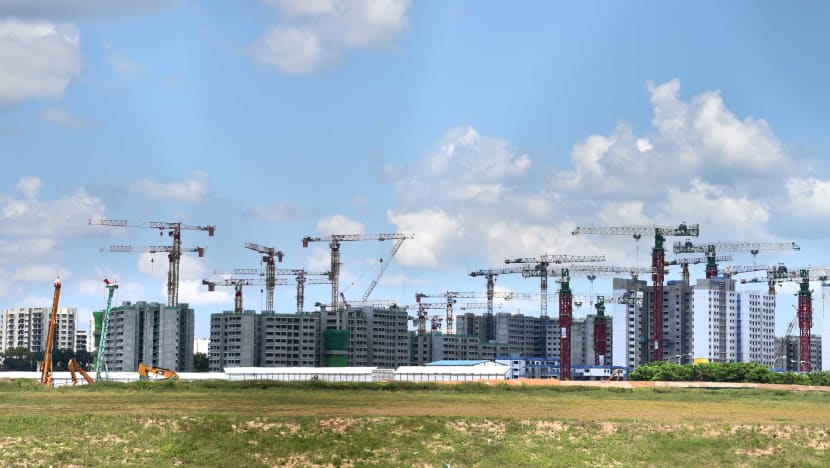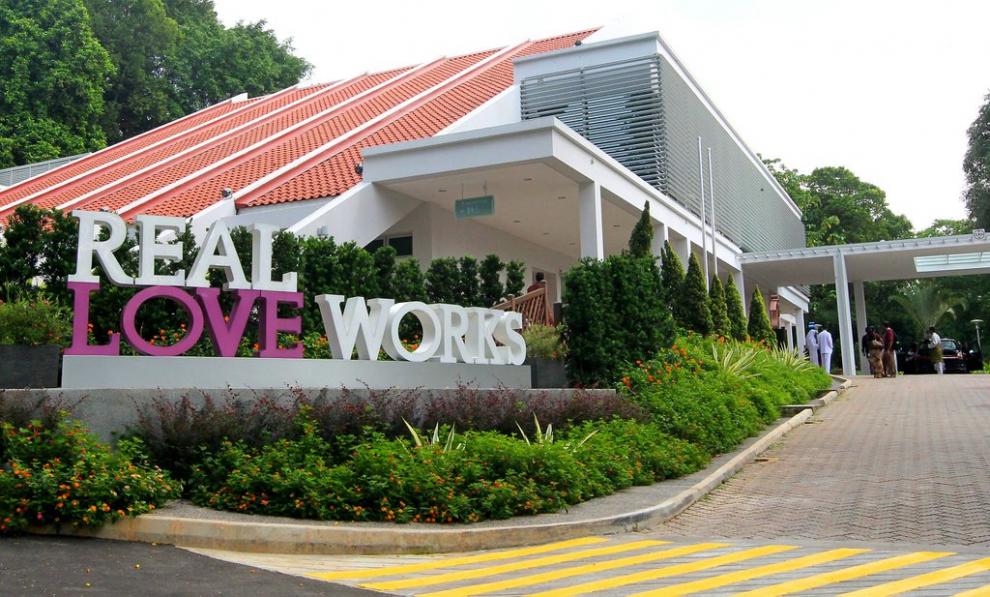Court settles divorced couple's fight over shares of BTO flat they had yet to get keys to
The couple bought the BTO flat while they were still married and divorced before taking possession of it.
HDB BTO flats in Tampines under construction. (File photo: Jeremy Long)
 @LydiaLamCNA
@LydiaLamCNA
02 Feb 2023 11:12AM(Updated: 02 Feb 2023 12:00PM)
Bookmark
WhatsAppTelegramFacebookTwitterEmailLinkedIn
SINGAPORE: A woman has won her court appeal to get her ex-husband to transfer his share of a Build-to-Order (BTO) flat to her.
As of January, the couple had not received the keys to the flat, which is in Tampines and had a purchase price of S$467,130.
According to judgments published on Thursday (Feb 2) and last month, the couple married in 2015 and had two children – one in 2016 and another in 2018.
In July 2017, the couple applied to purchase a flat along Tampines Street 61 from the Housing and Development Board (HDB), and they were allocated the flat.
In January 2019, the man left and stopped living with his wife and children. The woman commenced divorce proceedings in March 2019 and an interim judgment was granted in February 2020.
A Family Justice Court made various rulings for the divorce in May 2021, assigning, among other things, joint custody of the children with care and control to the woman.
Most of their identified matrimonial assets were to be divided in the ratio of 64.5 to 35.5, with the woman receiving the larger share.
However, the BTO flat, which was considered the matrimonial home, was to be surrendered or returned to HDB. The parties were to be refunded any money they had paid for it.
The couple had not taken possession of the flat, nor made full payment for it. Their purchase of the flat was not completed, court documents showed.
The woman appealed against the decision regarding the flat, and it was heard by the appellate division of the High Court.
She had argued in a lower court that if the flat was forfeited by HDB, it would amount to removing the flat from the matrimonial pool – to the loss of both parties.
She also argued that her children would eventually need a permanent home of their own. The woman is currently staying at her parents' flat with her children.
INITIAL REASONS FOR REJECTING THE WOMAN
The High Court initially rejected the woman's arguments, calling her "utterly selfish and self-centred", thinking of "only herself" with "no regard whatsoever" for her ex-husband.
Senior Judge Lai Siu Chiu pointed to both sides' Central Provident Fund savings. The woman had, as of Jan 8, 2020, a total of about S$256,600 in her CPF accounts, as she earned a monthly average salary of $4,936 as a nurse educator.
The man had a total of about S$105,400 in his CPF savings, less than half his ex-wife's. He earned a gross monthly salary of S$4,708 as an operations executive.
The woman had other savings of about S$68,000, while the man had only S$345 in his bank account. The Family Justice Court also noted how the woman had spent about S$75,000 in six months or about S$12,500 per month after her fixed deposit matured in December 2019.
The woman's previous arguments were dismissed because of the view that the flat's value had increased, and it would be wrong for her to benefit from the increase without a corresponding benefit to the ex-husband.
APPEAL JUDGE NOTES NEW OFFER
However, in Justice Woo Bih Li's decision on the appeal, he noted a material difference in the woman's new arguments.
She offered to pay the ex-husband whatever he had paid towards the deposit for the flat, as well as his shares of the stamp and conveyancing fees that he paid. This was with accrued interest, in exchange for the transfer by the ex-husband of his interest in the flat to her.
Justice Woo said this offer directly addresses the previous judge's concern that the woman's stance of not agreeing to refund her ex-husband his CPF money was unreasonable, especially since she had more than him.
Both parties had paid a total of S$16,141.50 each in deposits, stamp fees and conveyancing fees for the flat.
A valuation of the flat obtained by the woman shows that the flat is valued at S$467,130 as of May 31, 2021, the same as its sale price. This is because the flat is subject to a minimum occupation period (MOP).
The man submitted a late valuation report valuing the flat at S$660,000, but the court found this incorrect as the valuer had assumed it was eligible for resale in the open market and had not factored in the MOP.
Justice Woo addressed the previous judge's concern that the woman would potentially gain a windfall if the flat was transferred to her.
"With respect, we are of the view that such a concern is not relevant as the windfall is not based on the relevant date of May 31, 2021 but the future," he said.
"It takes into account a potential future increase in the price of the flat when it is sold after the MOP has elapsed. However, it must be remembered that the flat is not yet an asset that could be sold in the open market as the MOP would still apply on May 31, 2021 – the date that is to be used for the purpose of valuing the flat."
He concluded that there is "therefore no windfall to speak of as of May 31, 2021 and it is not open to this court to speculate what the potential price of the flat would be if it is sold in the future".
Justice Woo added that there is no real prejudice against the ex-husband, as he was willing to have the flat returned to HDB.
NO SENSE FOR FLAT TO BE RETURNED TO HDB
He said it would have made no sense for the flat to be returned to HDB just because the woman would "obtain a large and valuable asset without any further consideration or compensation to the husband".
Should the woman have to return the flat and apply for a new one at a presumably higher sale price, she would also have to go through the entire process and wait to be allocated a flat that might be at a different location.
"There was no good reason to make her go through all this. The needs of the children of the marriage is a factor that the court takes into consideration when dividing the parties’ matrimonial assets," said Justice Woo.
"The wife has care and control of two children of the marriage and it would be in their interest to have a permanent roof over their heads even though it was fortunate that all three of them could stay with her parents in the meantime."
He ordered the man to transfer his interest in the flat to his ex-wife, and for the woman to reimburse the man's CPF account for the deposit and other fees he paid.





